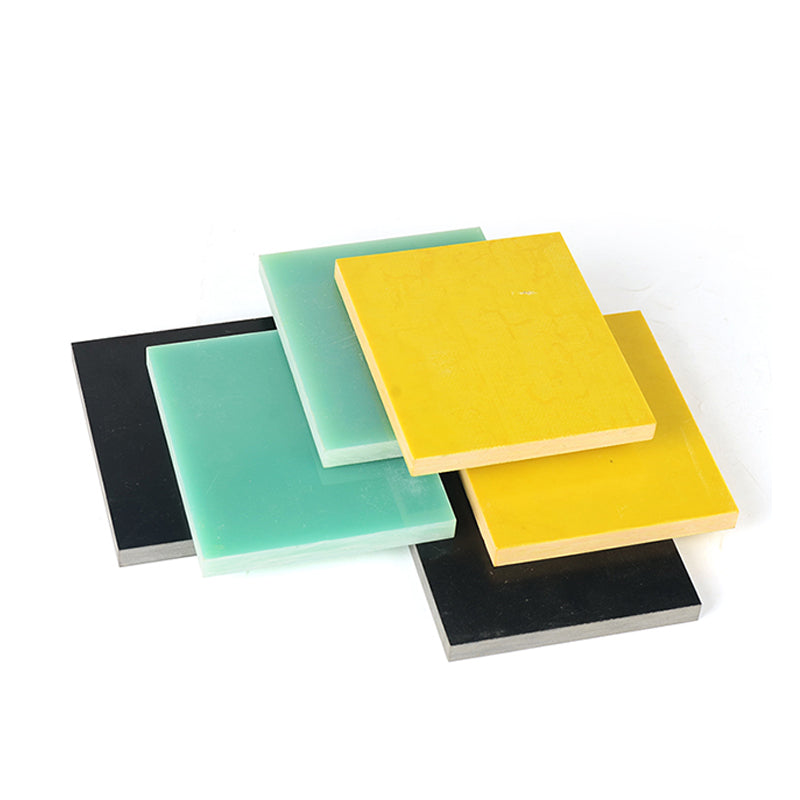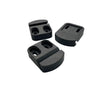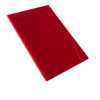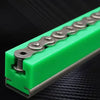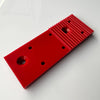The Benefits of CNC Machined Nylon Blocks for Mechanical Transmission and Custom Components
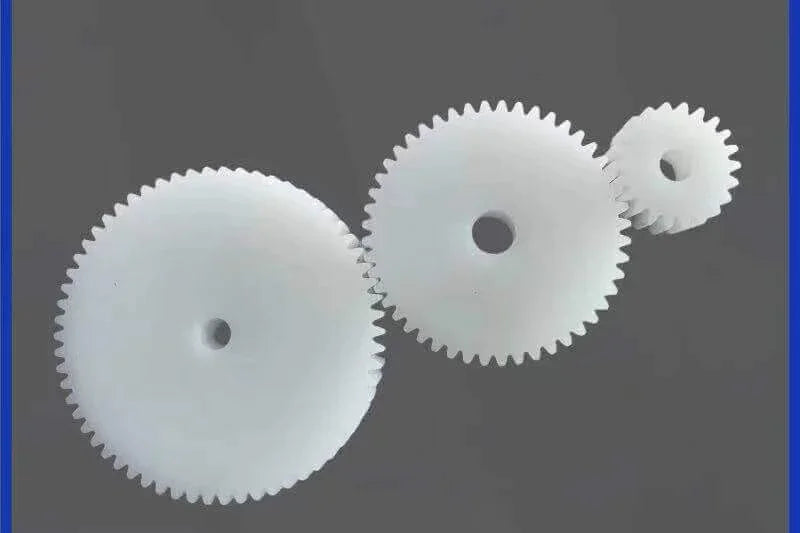
Why Nylon Blocks are Revolutionizing Mechanical Manufacturing
Nylon blocks have gained significant traction in the manufacturing industry, particularly in mechanical transmission systems and the production of custom components. As industries seek materials that are both durable and versatile, CNC machined nylon blocks have emerged as an ideal solution for their precision and adaptability. Nylon, as a synthetic polymer, offers a variety of benefits—high strength, durability, and low friction—which makes it well-suited for numerous industrial applications, providing reliable, long-lasting solutions.
🎉🎉🎉Limited Time Offer Use code: QR4GNY08SHVR at checkout and enjoy a special discount on your entire order! 👉 Nylon plastic

This blog delves into why nylon blocks are an excellent fit for various industrial applications and how CNC machining maximizes their potential. Whether reducing maintenance costs or enhancing the precision of custom components, CNC machined nylon blocks are revolutionizing mechanical manufacturing in significant ways.
What Are Nylon Blocks?
Nylon blocks are solid pieces made from nylon—a highly versatile synthetic polymer known for its excellent mechanical properties, such as strength, durability, and low friction. These blocks are commonly used in industries where reliable, wear-resistant materials are essential. Nylon blocks can be molded, cast, or machined to meet different specifications, making them highly adaptable for a wide range of uses. Among the various types of nylon, Nylon 6 and Cast Nylon are particularly notable due to their unique characteristics.
-
Nylon 6: Nylon 6 is well-regarded for its balanced mechanical properties. It offers toughness and fatigue resistance, making it a go-to material for applications that require sustained performance under stress. It also provides good strength and chemical resistance, which adds to its reliability.
-
Cast Nylon: Cast Nylon, made through a casting process, boasts superior dimensional stability and wear resistance. Its lower internal stress and better machinability compared to extruded nylons make it a preferred choice for creating large, high-performance parts that need to be durable and long-lasting.
Advantages of CNC Machined Nylon Blocks
CNC machining offers manufacturers the ability to precisely cut and shape nylon blocks into components that are tailored to meet specific requirements. Here are some of the key advantages:
-
Precision and Customization: CNC machining ensures an exceptional level of precision, enabling the creation of custom nylon components that meet exacting specifications. This level of accuracy is crucial for applications in mechanical transmission parts and other complex systems where even the slightest error can cause significant issues. CNC machining also supports the production of intricate designs that might be challenging or impossible to achieve through traditional manufacturing methods.
-
Cost Efficiency: By reducing material waste, CNC machining makes the production of custom nylon components more cost-effective, particularly for large-scale projects. Manufacturers can optimize the use of raw materials, thus cutting costs and contributing to more sustainable production practices.
-
Durability and Performance: Nylon blocks are known for their high strength and resistance to wear. CNC machining retains these properties, resulting in highly durable components that perform reliably even in demanding conditions. The combination of nylon’s inherent wear resistance and the precision of CNC machining makes these components highly suitable for continuous use in environments that require resilience against friction and stress.

Applications of Nylon Blocks in Mechanical Transmission
Nylon blocks are widely recognized for their suitability in mechanical transmission systems, thanks to their versatile properties. Here are some of the prominent applications:
-
Nylon Gears Manufacturing: Nylon blocks are an ideal choice for nylon gears manufacturing due to their lightweight nature, impressive wear resistance, and ability to minimize noise. Unlike metal gears, nylon gears help in significantly reducing operational noise, which is particularly advantageous for household appliances and automotive systems. Additionally, the self-lubricating nature of nylon further reduces the need for maintenance and improves overall efficiency.
-
Mechanical Transmission Parts: Nylon blocks are also used in producing various other transmission components, such as bushings, rollers, and guide rails. Their low friction and self-lubricating characteristics enhance efficiency and extend the lifespan of these components, making them a preferred choice for manufacturers aiming for long-term cost savings. By reducing system wear, nylon blocks contribute to increased durability and reduced downtime, ultimately improving operational efficiency.
Custom Nylon Machining Solutions
Custom nylon machining plays an essential role in industries that require components tailored to precise needs. CNC machining allows for the creation of nylon parts that fit perfectly into their designated applications, ensuring optimal performance.
-
Overview of Customization: Custom nylon machining provides a level of flexibility crucial for specialized components. CNC machining techniques allow precise cutting, drilling, and shaping of nylon blocks to meet intricate specifications. Whether the project demands unique geometries or tight tolerances, CNC machined nylon components can fulfill those needs.
-
Examples of Custom Components: Nylon blocks can be transformed into a variety of specialized components, such as spacers, gears, and machine parts. These components are particularly valued in industries like automotive, aerospace, and heavy machinery for their combination of strength and adaptability. Custom nylon components are also used extensively in medical devices, agricultural equipment, and conveyor systems, where dependability and performance are paramount.
Nylon 6 and Cast Nylon: A Material Comparison
When deciding between Nylon 6 and Cast Nylon, it is important to understand their differences and strengths. Both materials offer notable benefits, but their properties make them suitable for different applications:
-
Nylon 6: Nylon 6 is characterized by its fatigue resistance, which makes it highly suitable for components exposed to repetitive stress or motion. It is commonly used for CNC machined nylon components where durability is essential. Applications such as gears, bearings, and bushings benefit from Nylon 6’s ability to resist wear and handle mechanical loads.
-
Cast Nylon: Cast Nylon offers superior dimensional stability, making it the best choice for larger parts that need to maintain their shape under different environmental conditions. It is often used in mechanical transmission parts requiring enhanced wear resistance. Furthermore, Cast Nylon’s lower moisture absorption rate compared to extruded forms means that it retains its properties better in fluctuating humidity, ensuring consistent performance.

Why Choose Nylon Blocks for Mechanical and Industrial Applications?
Nylon blocks provide several benefits that make them a suitable choice for mechanical and industrial applications. They are valued for their consistent performance, especially in challenging environments.
-
Lightweight Yet Strong: The strength-to-weight ratio of nylon is one of its key advantages. It allows for a reduction in mechanical wear while maintaining robustness, which improves overall efficiency in moving parts and reduces strain on mechanical systems.
-
Chemical Resistance: Nylon’s resistance to oils, chemicals, and other harsh industrial substances ensures the longevity of components like nylon gears and other machine parts. This resistance makes nylon ideal for use in environments where exposure to chemicals could otherwise compromise the integrity of different materials.
-
Low Friction: The low coefficient of friction of nylon enables mechanical transmission parts and custom nylon machining solutions to operate smoothly, reducing wear and tear. This feature also contributes to lower energy consumption in machinery, positioning nylon as an energy-efficient option for industrial use.
Case Study: CNC Machined Nylon Gears in Transmission Systems
A recent project involved the use of CNC machined nylon gears in a transmission system, aiming to boost efficiency and minimize noise levels. By replacing traditional metal gears with nylon ones, the manufacturer achieved several improvements: quieter operation, reduced maintenance costs, and less frequent downtimes. Unlike metal gears, nylon gears required less lubrication, leading to easier maintenance and fewer disruptions to operations. This case study emphasizes how versatile and effective nylon blocks can be in real-world applications, especially for companies looking to improve cost efficiency and reliability.
Moreover, the reduced weight of nylon components contributed to lower overall machinery weight, which directly translated to decreased energy consumption. This advantage is particularly beneficial in the automotive sector, where every gram saved can have a significant impact on fuel efficiency and overall performance.
The Power of CNC Machined Nylon Blocks in Industry
CNC machined nylon blocks provide substantial advantages for both mechanical transmission and custom components, thanks to their versatility, durability, and cost-efficiency. Whether they are used in nylon gears manufacturing, bushings, or custom machine parts, nylon blocks offer a reliable solution for many industrial challenges. Their adaptability to CNC machining, combined with their superior material properties, makes them an ideal choice for manufacturers who aim to enhance efficiency, lower costs, and boost the durability of their products.
If you are in need of high-quality custom nylon components, get in touch with our team today to find out how we can help. With our expertise in CNC machining, we deliver precision-engineered nylon parts that can withstand the most demanding industrial environments.
🎉🎉🎉Limited Time Offer Use code: QR4GNY08SHVR at checkout and enjoy a special discount on your entire order! 👉 Nylon plastic

Your Nylon Block Questions Answered
-
What are the main advantages of CNC machined nylon blocks? CNC machined nylon blocks offer unparalleled precision, durability, and versatility, making them an excellent choice for custom components in mechanical systems. Their adaptability and cost-effectiveness make them a top choice across various industries.
-
How do Nylon 6 and Cast Nylon differ in industrial applications? Nylon 6 is well-suited for applications requiring fatigue resistance, while Cast Nylon excels in maintaining dimensional stability for larger components. Each type has unique advantages that make it suitable for specific applications, depending on operational needs.
-
Can nylon blocks be used in high-temperature environments? Yes, nylon blocks can be used in high-temperature environments, but it is important to choose the right type of nylon. Nylon 6 performs well at moderate temperatures, while certain grades of cast nylon are formulated to withstand higher heat levels.
-
Are nylon components environmentally friendly? Nylon is a durable material, which helps extend the lifespan of components and minimizes the need for frequent replacements, thereby reducing waste. Additionally, CNC machining processes can be optimized to reduce material usage, making nylon a more sustainable option for industrial use.
-
Posted in
Cast Nylon, CNC machining, custom components, industrial applications, mechanical transmission, Nylon 6, nylon blocks, nylon gears, precision engineering

